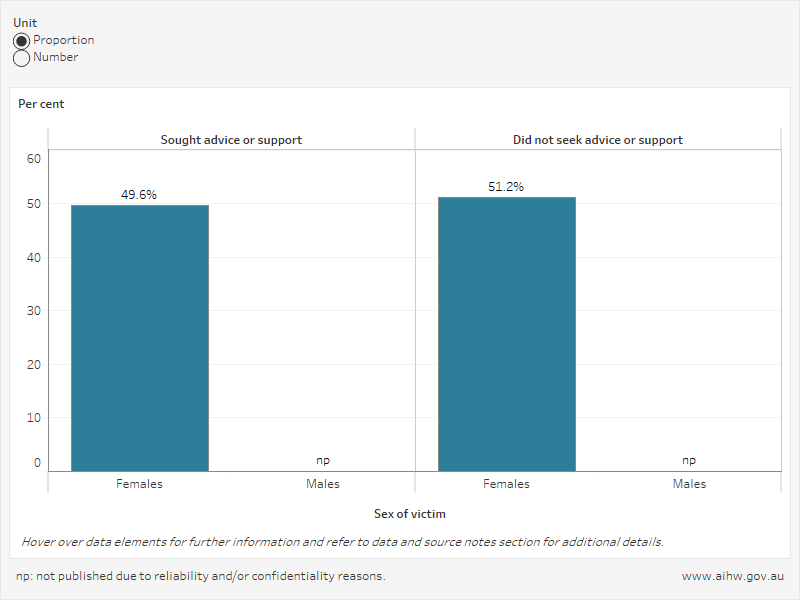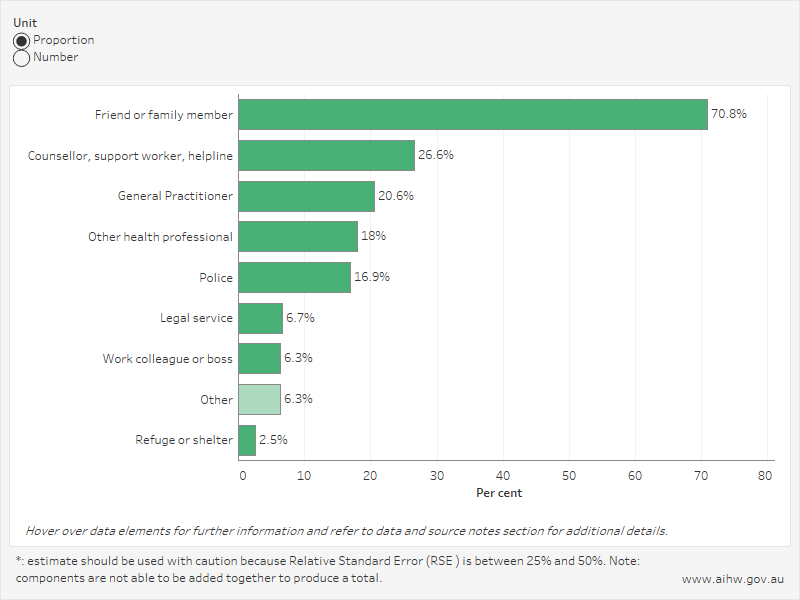Help sought after sexual assault
There are many formal and informal supports which may be used by people who experience sexual assault, including family and friends, health professionals and helplines. Information on how victims seek help can assist understanding and improvement of response strategies and provide information on the extent of under-reporting of sexual assault incidents in data collected as a by-product of service delivery. Data on advice or support (help) sought and received, after the most recent experience of sexual assault is available from the ABS Personal Safety Survey (PSS) which collects information on the experiences of violence for women and men in Australia.
The visualisation below shows the proportion and number of adults who sought advice or support after their most recent incident of sexual assault by a male perpetrator in the last 10 years. It shows that just over half of women (51% or 327,00) did not seek advice or support after their most recent incident of sexual assault by a male.
Victims who sought advice or support after most recent incident of sexual assault by a male perpetrator, by sex, 2016

Source data: Help sought after sexual assault tables (172KB XLSX)
The visualisation below shows the different sources of help received by females after the most recent incident of sexual assault by a male perpetrator in the last 10 years. Friends or family members were the most common source of help (71%) in 2016. Data for male victims are not available due to data quality issues.
Sources of advice or support received by females after the most recent incident of sexual assault by a male perpetrator, 2016

Source data: Help sought after sexual assault tables (172KB XLSX)
Notes
- The PSS defines sexual assault as an act of a sexual nature carried out against a person's will through the use of physical force, intimidation or coercion, including any attempts to do this. This includes rape, attempted rape, aggravated sexual assault (assault with a weapon), indecent assault, penetration by objects, forced sexual activity that did not end in penetration and attempts to force a person into sexual activity. Incidents so defined would be an offence under State and Territory criminal law.
- The PSS defines seeking advice or support as any instance where the respondent felt that they sought and consequently received advice or support for an incident. This may occur either at the time of the incident or at any time after. Advice or support means listening to the respondent, being understanding, making suggestions, giving information, referring the respondent to appropriate services, or offering further help of any kind. Excludes anyone who was told or found out about the incident, but from whom the respondent did not actively seek advice or support, and care sought for injuries which did not involve the respondent seeking advice or support.
- Most recent incident is limited to the last 10 years only.
- For the visualisation on sources of advice or support, the proportion is based on female victims who sought advice or support after most recent incident, not all victims. For example, 16.9% of female victims who sought help after their most recent incident, felt that they received advice or support from police.
- Components for sources of advice or support sought after most recent incident are not able to be added together to produce a total. Where a person has sought advice or support from more than one source, they are counted separately for each source but are counted only once in the aggregated total.
- Other sources of help, includes support from financial service, government housing and community services, and priest/minister/rabbi/other spiritual advisor.
-
The PSS collects information from women and men aged 18 years and over.
-
Survey data, obtained from a sample of the population, is subject to sampling error. Where estimates are subject to a level of sampling error too high for general use, they are not included in visualisations, but are included in data tables, with caveats.
-
The observed value of a rate may vary due to chance even where there is no variation in the underlying value of the rate. The margin of error is the largest possible difference (due to sampling error) that could exist between the estimate and what would have been produced had all persons been included in the survey. Confidence intervals—constructed by taking the estimate plus or minus the MoE— can be used to provide an approximate indication of the true differences between rates. If the confidence intervals do not overlap, the difference can be said to be statistically significant. However, statistically significant differences are not necessarily the same as differences considered to be of practical importance. Small differences that have practical importance may be found to be not statistically significant as they are below the threshold the significance test can reliably detect.
-
For more information see Methods, Glossary and Data sources.
Sources
ABS 2016 Personal Safety Survey
Next expected: 2022


